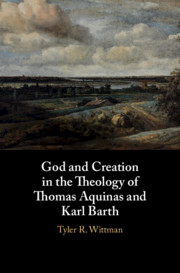Book contents
- God and Creation in the Theology of Thomas Aquinas and Karl Barth
- God and Creation in the Theology of Thomas Aquinas and Karl Barth
- Copyright page
- Dedication
- Contents
- Acknowledgments
- Abbreviations
- Note on Citations and Translations
- Introduction
- Part I God's Being and Activity According to Thomas Aquinas
- Part II God's Being in Act According to Karl Barth
- Conclusion
- Bibliography
- Index
- References
Bibliography
Published online by Cambridge University Press: 05 November 2018
- God and Creation in the Theology of Thomas Aquinas and Karl Barth
- God and Creation in the Theology of Thomas Aquinas and Karl Barth
- Copyright page
- Dedication
- Contents
- Acknowledgments
- Abbreviations
- Note on Citations and Translations
- Introduction
- Part I God's Being and Activity According to Thomas Aquinas
- Part II God's Being in Act According to Karl Barth
- Conclusion
- Bibliography
- Index
- References
- Type
- Chapter
- Information
- Publisher: Cambridge University PressPrint publication year: 2018



